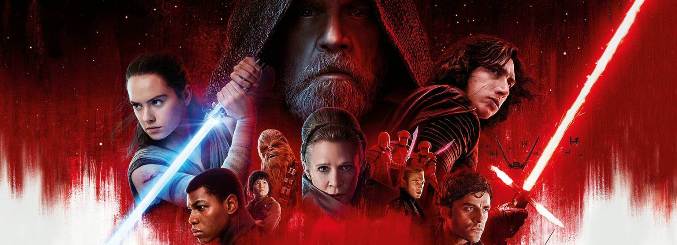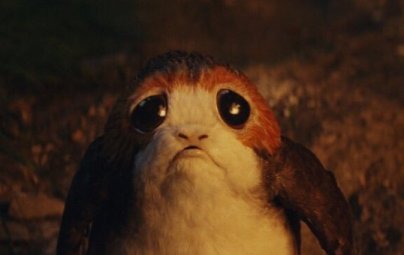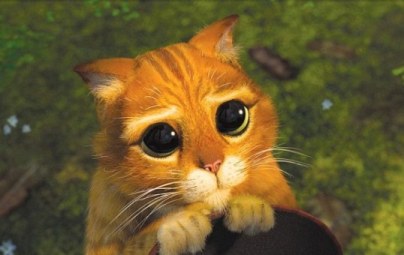| Film Reviews | ||
| Text | ||
| Text | ||
|
|
 |
||
|
||
| December, 2017 | ||
|
Summary:
I wouldn’t say I had high hopes for this film, but they were certainly higher than for The Force Awakens. Why? Because last year’s Rogue One largely redeemed my faith in the franchise. Gareth Edwards's film was, without a doubt, the best Star Wars flick since The Empire Strikes Back. After thirty-six years of failed attempts, it finally felt like we were back in form. However, just ten minutes into The Last Jedi, it was clear that Rogue One was not the beginning of a return to glory, but a stand alone, and that I was going to be disappointed once again. My first issue with The Last Jedi is a flaw that also plagued The Force Awakens: No one behaves like an adult. From Rey moronically “reaching out” for the force to Vice-Admiral Holdo chastising Poe (an officer and hero) as if he was her teenaged son, everyone here behaves in a puerile way. Someone at Disney must think that having mature characters doesn’t sell. Perhaps it would alienate the targeted Tween market. I’m not sure the reason, but it seems to be endemic of Hollywood these days. I see it in both the Star Wars and Star Trek reboots. Chris Pine’s rendition of Kirk also behaves like a child, rolling his eyes, storming off, saying childish things, “What are you talking about, man.” (I delved in to this in my review of The Force Awakens.) This was particularly egregious for Luke Skywalker, who finished The Return of the Jedi as a young man destined for great things; a character with presence, gravitas, and charisma, who should have been depicted in a way that was reverent of his saving the universe. As noble. But for some reason, despite his advanced years, Luke Skywalker seems to have reverted to the mental maturity of a fifteen year old. Let’s take a look. Soon enough we learn that the venerable Jedi master had a student who was becoming evil and Luke considered murdering him for “the greater good” (okay, that’s interesting!), but when Luke fails to do the deed and finds the student has murdered many of his other Padawans AND gone off to join the dark side, what does he do? He runs from his problems and lets the student go. Really? The guy who spent the first trilogy saving the galaxy and getting Darth Vader to turn to good? That guy runs away from his bratty teenaged nephew! He doesn’t track him down? He doesn’t try to protect his friends, his brother-in-law, or his sister? He abandons the rebellion? Something he’d risked his life for many times? Not only is it bad writing, but it’s completely inconsistent with the character. And it’s such a shortsighted way to use one of the greatest characters in science fiction. What a waste. Of, course, Luke didn’t really need a conflict to make this story work. Not every character needs to be flawed. He should have been cast in a supporting role to Rey, whose storyline was WAY underdeveloped (beyond sparring with a rock, did she learn anything about being a Jedi?). Luke should have played the wizard to the apprentice. The Gandalf to Frodo, the Dumbledore to Harry, the Obi-wan Kenobi to Luke. |
 |
| Imitation is the lowest form of creativity. |
 |
| Who is cuter? The Last Jedi's numerous rip-offs all fell short of their source material. |
Movie Making by Marketers. I suspect it was the committee that was responsible for having way too many storylines in the film. Probably because they wanted to have lots of different characters so that no marketing niche was left untapped. But so many characters weigh heavily on the film. You can see the problem by looking at how the Star Wars movies have become increasingly complex (and disjointed) over time. In the original Star Wars there was really only one storyline—Luke’s journey. The Empire Strikes Back had two—Luke’s journey, and Leia and Han’s fleeing from Vader. The Return of the Jedi had three—Luke’s journey; Leia, Han and the Ewoks; and Lando and friends blowing up the Death Star. In The Last Jedi we have four storylines: Rose and Finn; Rey and Luke; Rey and Kylo Ren (largely via psionics); and Leia, Holdo and Poe with the fleet. The result is a story that becomes too crowded. There is little chance for any character to develop and become three-dimensional. Rather they exist as avatars—static, as in a video game, never becoming profound. For example, Finn’s showdown with Captain Phasma could have been much more powerful if given more space and development. This is, after all, the story of a runaway slave who confronts his master. While many people feel that Disney’s most appalling wrench in the clockworks was the insertion of the narratively insignificant porgs (yes, I hated the Ewoks, but at least they DID something), for me it was when Laura Dern appeared as Vice-Admiral Holdo. It was a moment that screamed “miscast!” Everything about her said “not from this universe.” While some might say that at least Disney is being progressive in its depiction of women, it feels much more like a marketing decision than a sincere attempt to make a strong heroine. As my fellow critic, Will James, pointed out, it’s pandering, not progress. And the purple hair. I’m sorry, but I can’t let it slide. She's human, right? Not an alien. So why the purple hair? It felt as if Disney was looking for a new niche market and the purple hair was directed at the cohort of gender confused junior high schoolers. Don’t get me wrong, Vice-Admiral Holdo could have been a great character with the proper casting and the right story. Kate Mulgrew pulled it off in Voyager. Sigourney Weaver pulls this off in… well, everything, and Cate Blanchett would have rocked in this role (sans the lavender locks). But Laura Dern just didn’t work for me. Nothing about her presence, her acting, or her dialogue conveyed that she was an experienced leader, right down to withholding information from Poe. A smart commander knows how to manage people. As with Luke, we see Holdo acting in irrational ways to build bogus narrative tension. This strange plotline with Holdo and Poe, wherein the fighter jockey needs to learn to follow orders is a jejune way to create conflict, a way for Johnson to get from A to B. And it’s also the wrong message for a Star Wars movie. Let’s think about this. Johnson is saying that Poe is too impulsive and needs to learn to have faith in his leaders, even when the leader’s actions don’t make sense. (Hmmm, that’s a tough pill to swallow in the age of Trump.) And, as I said, it’s the wrong message for a Star Wars Film. This is a franchise based on Westerns and in a Western the hero or heroine always knows better than the group. The best examples being Episode IV (“Luke, you’ve turned off your targeting computer.”) and Rogue One (the name says it all). Whether it’s Will Kane (Gary Cooper) defying the spineless locals in High Noon or John McClain (Bruce Willis) doing the real work for a hapless LAPD and FBI in Die Hard, the cowboy (and his modern incarnations) always follows his instincts…a concept that George Lucas cleverly blurred with the Force. This is classic Joseph Campbell, the cultural anthropologist whose work Lucas came across while writing Star Wars and helped inspire the structure of the original films. Now, I’m going to go old old school here for a minute. But bear with me, because the final result is an important one. To make a successful hero you have to follow certain steps. Here is a brief intro: If you apply these steps to the story of Theseus, for example, you can see how intelligent the writing is and why this is an enduring story. In defeating the Minotaur, Theseus shows he is willing to die for the betterment of society and, in the process, kills his internal monster—his own selfishness. He is thus reborn worthy to rule Athens, which he can now purge of corruption. This is a perfect hero narrative for a society plagued by corruption. It’s also a hero narrative that could inspire a culture to better itself. George Lucas discussed this idea with Bill Moyers in 1999. “[Myths] try to show us our place. Myths help you to have your own hero’s journey, find your individuality, find your place in the world, but hopefully remind you that you are part of a whole. And that you must also be part of the community, and think of the welfare of the community above the welfare of yourself.” And Poe? What is his internal struggle? He acts on impulse, doesn’t trust authority, and believes in himself. (Okay, at least he has a struggle.) How does this struggle reflect a problem in society? Hmm, already the writing is starting to break down. The committee at Disney never got this far. All they could come up with is some generic dramatic tension to give Poe and Leia and Holdo something to do while the other storylines limped along toward the special-effects laden climax. It is, quite simply, cinematic masturbation. Of course, in the original Star Wars Luke did follow the classic hero structure. It’s the story of how Luke overcame his self doubt and stood up to an enormous global empire, reflecting the way that Lucas felt people needed to stand up to the US government as it waged a high-tech war on a low-tech population in Vietnam. There are plenty more examples of how the awful writing cripples this movie, but Rey’s storyline stands out as one of the worst. She makes no progress as a character (either internally or externally) even though she had many opportunities to do so. Perhaps the weakest scene of the whole film was her descent into the pit of the dark side where she finds….wait for it! Reflections of herself! What the hell does that mean? Well, of course, it could mean anything. It’s a cop out. And what does Rey learn when she looks into her own psyche? By her own admission, nothing, which strongly suggest that she is simply pure, incorruptible, and a (completely flat) champion of good. But that actually alienates her from the audience, making her less likeable rather than more. Luke’s failure in the cave proves to the audience that he is, like them, human, which helps the viewer empathize with him. But I guess I shouldn’t be surprised that the characters are so two-dimensional or that no one at Disney could take the time to even read up on Joseph Campbell, arguably George Lucas’s most important influence. Disney is not interested in making a film that is artistic, or that makes a statement about our culture, or having heroes and heroines who challenge our cultural problems. They are interested in selling you stuff. Update: If you want to see Joseph Campbell's structuralism done well, check out Black Panther. Like Theseus, King T'Challa, must prove himself a worthy ruler by breaking from the past. But in this case, it's not corruption, but isolationism. Only when he acknowledges the sins of his father and the consequences of the nation's seclusion (personified in the character or Erik "Killmonger" Stevens) does T'Challa gain the wisdom and power to defeat his enemies and be king. What's more, it's a timely cultural message and one that I hope will inspire people in America and the world to stop building walls. Is it intentionally unoriginal? It’s quite obvious that Rian Johnson was watching way too much Battlestar Galactica (BSG) while writing this script. The central premise of the movie is stolen from the first episode of season one, “33” wherein the cylons are tracking the fleeing armada through hyperspace and appear every thirty-three minutes. With all the money they were paying Johnson, you’d think he could have come up with a more original plot. Not only is it not original, but it’s not even as good as Battlestar, which had the added tension created by the possibility of a traitor in their midst and the psychological torture of no one able to sleep. Another BSG ripoff, also done less skillfully than the original, was the psychic connection between Rey and Kylo Ren, something that was done brilliantly between Gaius Baltar and Number Six in BSG. And hey, it’s cool when Poe’s ship flips around in zero gravity like they do in Battlestar, but that’s breaking the laws of the Star Wars universe. Spaceships don’t do that here. In Star Wars there is a weird sort of gravity, as Johnson proved minutes later in the movie with a bombing raid wherein the bombs somehow fell downward. In doing this Johnson has created a contradiction. Why haven’t all the other space ships been doing zero gravity flips in all the other battles? And what mechanism allows the ship to do this? In Battlestar Galactica the ships have small thrusters around the fuselage that allow them to flip and turn, but not an X-wing. While it may sound like I’m being super nerdy and nitpicky, it’s actually important because the gist of this is that Johnson had no qualms about adulterating the canon for a little visual “pop.” And while Johnson has publicly cited BSG as an influence, someone needs to tell him that citing something as an influence doesn’t give you the right to plagiarize it. It’s a little like Vanilla Ice citing Queen’s “Under Pressure” as an influence for “Ice Ice Baby.” I honestly hope that NBCUniversal takes the same approach as Queen and David Bowie did. Sue him. It appears that we have come full circle. The original Battlestar Galactica was a rip-off of Star Wars that was cancelled halfway through its first season. But the 2004 reboot was so successful (it really is spectacular, if you haven’t seen it) that Disney finds it necessary to mine it for good ideas. Sigh. Other instances of [cough] “recycling” abound. Such as the shameless Puss-in-Boots shot of the porgs. Cha-ching! One can just imagine the presentation at Disney. “Mr. Iger, our research has concluded that for every 100,000 audience members who see The Last Jedi, there will be $5000 in revenue from stuffed porgs.” Lastly, Finn and Rose’s excursion to the Canto Bight tries to make a statement about arms dealers (okay, a valiant effort), yet doesn't feel fresh because that theme was recently explored in Star Trek: Into Darkness. Speaking of the power of Disney, one has to wonder about the inordinately positive reviews of this film. Most people I talked to were, like me, disappointed. Yet The Last Jedi, has a 90% positive critic rating from Rotten Tomatoes, including positive reviews from NPR, The Atlantic, Time, and RogerEbert.com. Yet the “audience liked” rating on Rotten Tomatoes is only 40% positive. (In contrast, Rogue One has an 85% positive critic rating and an 87% positive audience rating, and The Force Awakens has a 93% and 88%, respectively). I have never seen such a huge disparity between the critic rating and audience rating for a mainstream film. How is it possible? I believe it has to do with Disney’s deep pockets. Perhaps the final installment in the trilogy should be a remake of Theseus versus the Minotaur as it seems that corruption has once again returned to Athens. |
WHERE DO YOU WANT TO GO ? |
